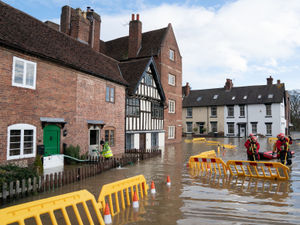Star comment: Time to look at why the Severn floods so often
For residents and businesses living near the River Severn all their calculations and all their assumptions about the flooding risk are having to be recalibrated.

The river has always been subject to severe flooding, but with extended periods in between in which folk have been spared.
The floods were an inconvenience, but ultimately an occasional inconvenience which was factored in as part and parcel of being cheek by jowl with a major waterway. For a while there was even a mistaken belief among some that the building of major reservoirs in Mid Wales had put an end to flooding of the Severn for good.
Listening to the heartbreaking testimony of those hit this time round, there is a familiar theme. Yes, they knew there would be floods from time to time. But this...
Not now once in a generation. Not now once every few years. Flood, wreck, and ruin, every year, with the demoralising task of rebuilding and recovering, whether it be a devastated business, or a sodden household, every time. It is enough to break the morale of anybody and our sympathies go out to all those affected for whom the reserves of stoicism are being severely tested under repeated blows. Businesses hoping to rebound from the coronavirus pandemic have been set back. Flood defences are a key part in tackling the problem, and these need to be developed and improved as anti-flood technologies progress.
There is also the question of why it is happening so regularly nowadays. Is it a product of an increasingly concreted, urbanised landscape, of paved-over drives and torn up green spaces? Or is there another reason why we are seeing more serious flooding on a regular basis. So beefed-up flood defences, and anti-flood measures, yes. But there also needs to be a close look at why it is happening in the first place – and whether there is more that can be done to reduce the risk of further, devastating floods.
University – a place to expand horizons, reach your potential, and be exposed to challenging new ideas (possibly, you never know about that these days).
But only, of course, if you’ve got a maths and English GCSE.
At least that is the suggestion being put forward by a review into higher education funding – no GCSE in those subjects, no student loan.
Which all seems rather odd. It would be a no second chances policy which assumes youngsters are incapable of flowering late. It denies opportunity to those who may have struggled at school with logarithms but have latent brilliance in other fields which could be unleashed by the nurturing university environment.
Restricting university to those who are capable at maths may save some money on student loans but from the academic and cultural perspective it doesn’t add up.





